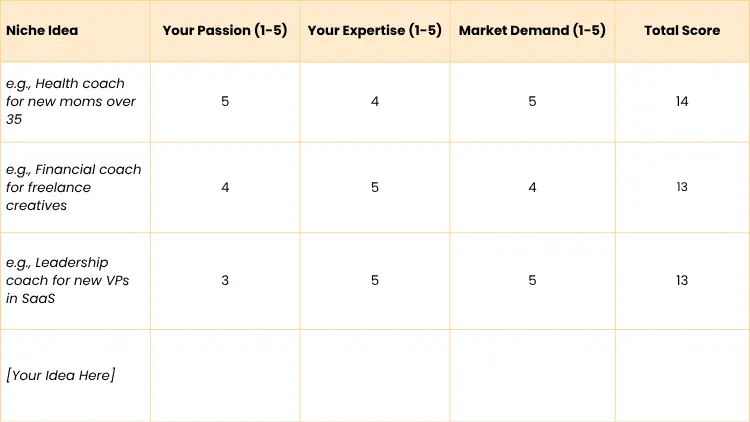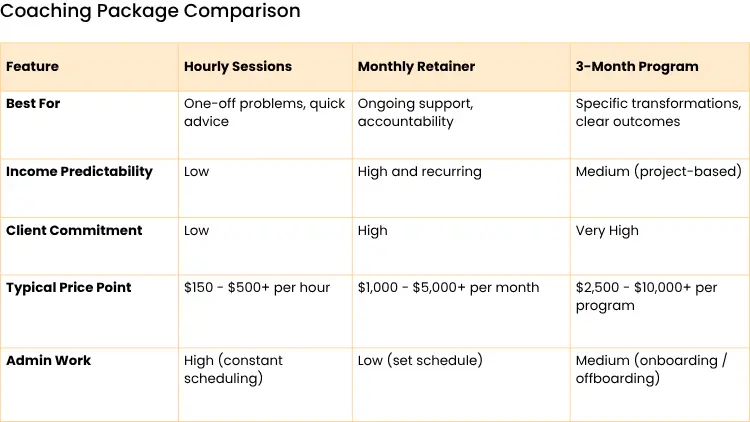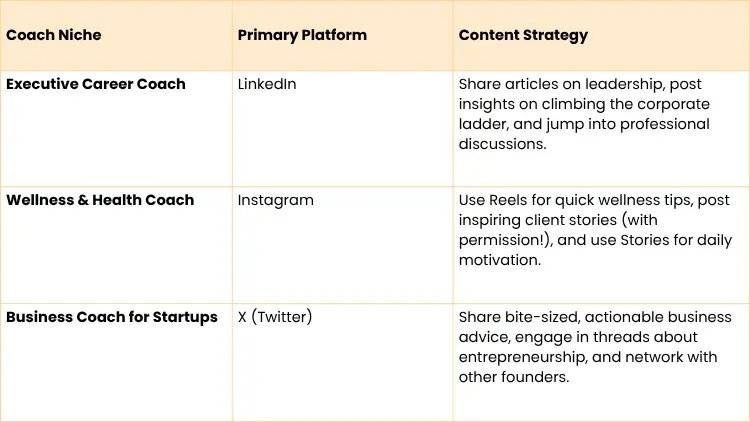How to Start Coaching Business: Tips to Succeed Fast

Every great coaching business starts with one simple, foundational question: who, exactly, do you serve and how do you help them? Getting this right from the beginning is what separates struggling generalists from in-demand specialists. It’s the choice that shapes every other decision you'll make, from your marketing message to your pricing structure.
Jump To Section

Earn As You Learn
Earn 25% commission when your network purchase Uplyrn courses or subscribe to our annual membership. It’s the best thing ever. Next to learning,
of course.
Lay the Groundwork for Your Coaching Business
Before you can even think about websites or client contracts, you need absolute clarity on your direction. Without a laser-sharp focus, your message gets lost in the noise, making it nearly impossible to attract the clients who desperately need what you offer.
The goal here is to move from a vague idea like "I want to be a life coach" to something specific and magnetic, like "I'm a career transition coach for first-time managers in the tech industry". That level of precision isn't limiting—it's your greatest competitive advantage.
And you’re getting into this at an incredible time. The global number of coaches shot up by 54% between 2019 and early 2023. The industry is now pulling in an estimated $5.34 billion in annual revenue. This explosion means there's huge opportunity, but it also screams one thing: you have to stand out.
Why Niche Clarity Is Non-Negotiable
Trying to be a coach for everyone is a fast track to becoming a coach for no one. It sounds harsh, but it's true. A well-defined niche makes your marketing a million times easier and instantly positions you as a trusted expert.
When your ideal client comes across your website or social media, they should have a visceral reaction: "This person gets me". That powerful connection only happens when you understand their world, their secret fears, and their biggest dreams on a profound level.
A narrow niche doesn't shrink your business; it focuses it. When you concentrate your energy on a specific group of people with a specific problem, you become the only logical choice for them. This makes it so much easier to attract high-quality clients who are ready to invest in a real solution.
Actionable Insight: Go to LinkedIn or Instagram and search for #lifecoach. You'll see thousands of generic profiles. Now search for #careertransitioncoachfortech. The results are fewer, more focused, and speak directly to a specific audience. This is the power of a niche in action.
How to Pinpoint Your Perfect Niche
Finding your coaching niche isn't about pulling an idea out of thin air. It’s a process of discovery, sitting right at the intersection of three crucial elements. The sweet spot—where the most successful coaching businesses are built—is where these three circles overlap.
- Your Passion: What topics light you up? What problems do you genuinely get a kick out of solving? Your energy is infectious, and it's what will keep you going when the entrepreneurial journey gets tough.
- Your Expertise: What do you know? What have you done? This doesn't mean you need a PhD or a fancy certification. It can come from navigating a tough career change, mastering a new skill, building healthier habits, or scaling a side hustle into a full-time gig.
- Market Demand: Here's the reality check. Is there a group of people out there actively looking for a solution to the problem you solve? And more importantly, are they willing and able to pay for that solution?
Practical Example: Let’s say you’re a former project manager who burned out from the 9-to-5 grind and successfully built a thriving freelance career. Your niche could be "a burnout recovery coach for corporate professionals who want to build a sustainable freelance business". This perfectly blends personal experience (passion), project management and business skills (expertise), and a massive market need (demand).
To help you get started, we’ve put together a simple framework. Use this table to brainstorm and score a few different niche ideas. Be honest with your ratings!
Niche Selection Framework
Use this simple scoring system to evaluate your potential niche ideas. The goal is to find an idea that scores high across all three categories, indicating a strong foundation for your business.
The highest score isn't automatically the winner, but it's a fantastic indicator of where you should focus your research. A niche with a total score of 12 or higher is usually a strong contender.
When you nail your niche with this level of detail, you build an incredibly powerful foundation. Suddenly, every blog post you write, every service you design, and every networking conversation you have feels aligned and purposeful. This clarity doesn't just attract the right clients—it gives you the unshakeable confidence to charge what you're truly worth.

Getting Your Legal and Financial Ducks in a Row
Turning your coaching passion into a real-deal profession means you've got to treat it like a business from the jump. This isn't the boring part; it's the part that protects you, your clients, and your future success. Setting up a solid legal and financial framework might sound like a headache, but it’s really just a series of straightforward steps.
The first big decision you'll make is your legal structure. This one choice affects everything from your personal liability to how you'll handle taxes, so it’s a critical piece of the puzzle.
Picking Your Business Structure
For most coaches flying solo, it really comes down to three main options. Each has its own flavor, so let's break them down.
- Sole Proprietorship: This is the default setting. If you start coaching and someone pays you, congratulations, you're a sole proprietor. It's super simple and cheap—your business income just gets reported on your personal tax return. The big catch? There's zero liability protection. If something goes wrong and your business gets sued, your personal assets (your house, your car, your savings) could be on the line.
- Limited Liability Company (LLC): We often call this the sweet spot for new coaches. An LLC creates a legal wall between you and your business. It’s like a financial force field for your personal life. Yes, it involves a bit more paperwork and a registration fee, but the peace of mind is worth every penny. For tax purposes, it’s usually a "pass-through" entity, so it's not much more complicated than a sole prop come tax time.
- S Corporation (S-Corp): Think of this as a tax status, not a separate business structure. You can actually have your LLC choose to be taxed as an S-Corp. This move can lead to some nice tax savings once your profits start hitting a certain level—usually around the $60,000-$80,000 mark. But, it also brings more complexity, like the requirement to run payroll for yourself.
Honestly, for a coach just getting started, an LLC is almost always the most practical and protective choice. It gives you that crucial liability shield without the S-Corp's administrative headaches.
Let us paint a picture for you: A career coaching client quits their job based on a session with you, and it doesn't work out. They decide to sue. As a sole proprietor, their lawsuit could come after your personal savings. As an LLC, the claim is generally limited to your business assets, keeping your personal finances out of the crossfire. See the difference?
Naming and Registering Your Business
Once you've landed on a structure, it’s time to give your business a name. Make it memorable, make it meaningful, and most importantly, make sure it’s legally available. Do a quick search on your state's business registry and the US Patent and Trademark Office's database to ensure you're not stepping on anyone's toes.
Got the green light? Now you can officially register your business with the state and local authorities. The process looks a little different everywhere, but it usually just means filing some forms and paying a fee. This is the step that makes it all real—and it's what you'll need to open a business bank account.
Actionable Insight: Go to your Secretary of State's website and search for their "Business Entity Search" tool. You can check if your desired business name is available in minutes. Next, use a service like LegalZoom or Incfile to handle the LLC filing for you; it simplifies the paperwork and ensures it's done correctly.
Your Legal Toolkit: The Must-Have Documents
With your business officially on the map, you need the right paperwork to manage your client relationships. These aren't just formalities; they are tools that build trust, manage expectations, and protect your hard-earned income.
Getting a handle on the essential legal documents for startups is a great starting point. For any coach, the absolute cornerstone is your client coaching agreement.
Your coaching agreement is your rulebook. It needs to clearly spell out:
- Scope of Services: What do they get? What don't they get? Be crystal clear.
- Session Terms: How many sessions, how long are they, and how often will you meet.
- Payment Policy: The numbers and the deadlines. How and when do you get paid?
- Cancellation & No-Show Policy: Your time is your most valuable asset. Protect it. What happens if a client flakes?
- Confidentiality Clause: Reassure your clients that what's said in a session, stays in the session.
- Disclaimer of Liability: This is huge. You need to clarify that you are a coach, not a licensed therapist or financial advisor, and that the client is ultimately responsible for their own choices and results.
Getting all of this in writing from day one prevents awkward conversations down the road and shows every new client that you're a professional who takes your work—and their success—seriously.
Crafting Your Coaching Packages
Figuring out how you'll structure and price your coaching services is easily one of the biggest decisions you'll make. It’s not just about money—it directly shapes your income, your clients' level of commitment, and how people see the value of what you offer.
The secret to a sustainable coaching business? Ditching the simple hourly rate and building well-defined packages. This small shift changes the conversation entirely. You stop trading time for money and start selling tangible, life-changing outcomes. It’s a much more powerful way to frame your work.
Shifting from Hourly Rates to Value-Based Packages
When you're new, charging by the hour feels like the simplest path. But honestly, it often devalues your expertise and tends to attract clients who aren't fully bought into the process. The better move is to create packages that solve a specific, significant problem for your ideal client over a defined period.
A great package bundles your core coaching sessions with other valuable resources, creating a complete solution. This gives your clients a clear roadmap to success and gives you a much more predictable income stream.
Practical Example: Imagine a career coach who helps new managers find their footing. Instead of selling one-off sessions, she could create a "Leadership Launchpad" package.
This isn't just a handful of meetings; it's a three-month program that includes:
- Six one-on-one coaching sessions to tackle their most pressing leadership challenges.
- Unlimited email support between calls for quick questions and accountability.
- A 360-degree feedback assessment to uncover blind spots and key growth areas.
- A personalized development plan that serves as their guide long after the coaching ends.
See the difference? This is positioned as a high-value career investment, not an expense. This model naturally builds deeper client relationships and, not surprisingly, leads to far more profound results.
Designing Your Coaching Offers
So, what do these packages actually look like? There are a few tried-and-true models out there. The right one for you really depends on your niche, your personal coaching style, and what your clients truly need.
Let's break down three of the most common frameworks.
- The Signature Program: This is your flagship offer. It’s typically a multi-month (think 3, 6, or 12 months) deep-dive program designed to take a client from a specific starting point to a powerful, desired outcome.
- The Monthly Retainer: This model is perfect for ongoing support, especially in business or executive coaching. Clients pay a recurring monthly fee for a set number of sessions and consistent access to you.
- Group Coaching Programs: A fantastic way to scale your impact. This lets you serve multiple clients at once, making your coaching more accessible while creating a powerful community dynamic.
To help you decide what's best for your business, here’s a quick comparison of these popular package models.
Each model has its pros and cons. A 3-month program often provides the best balance of client commitment and predictable revenue, making it a great place to start.

How to Price Your Coaching Services
Let's talk about pricing. It's a mix of art and science, and almost every new coach struggles with it. It’s so easy to undercharge out of fear, but that can crush your confidence and attract clients who aren't truly invested. Your prices must reflect the immense value you provide.
A solid pricing strategy is built on your income goals, your experience, what the market will bear, and the incredible results you help clients achieve. And the market is strong—the global coaching industry was valued at $6.25 billion and is still growing. In the US alone, business coaching is a $20.0 billion market, proving that people are willing to invest in their growth.
A huge mistake new coaches make is pricing their services based on what they think they would pay. Don't do that. Price them based on the value of the problem you solve. If you help a client negotiate a $20,000 raise, your $3,000 coaching package suddenly looks like an amazing return on investment.
Actionable Insight: Use this simple formula to get a baseline price.
- Set Your Desired Annual Income: Be realistic, but don't sell yourself short. Let's aim for $80,000.
- Add Your Business Expenses: Factor in everything—marketing, software, training, etc. Let's say that's another $10,000. Your total revenue goal is now $90,000.
- Decide How Many Clients You Can Serve: Be honest about your capacity. How many clients can you truly give your best to? Maybe it’s 5 clients per quarter, or 20 for the whole year.
- Calculate Your Package Price: Now, just divide your revenue goal by your number of clients ($90,000 / 20 = $4,500).
This simple math suggests a price point around $4,500 for your signature program. It's not a magic number, but it's a logical, data-driven starting point you can feel confident about.
If you plan on adding digital products to your offerings, this guide on how to price your online course has some great strategies that you can easily adapt for coaching.
Building a Brand That Attracts Your Ideal Clients
Okay, so you've mapped out your coaching packages. What's next? It’s time to build a brand that acts like a magnet for the exact people you want to work with.
A strong brand is so much more than a logo or a slick color palette. It’s the entire vibe people get from you. It instantly tells them who you are, who you help, and the incredible transformation you can make happen.
In a sea of over 100,000 active coaches, a compelling brand isn't a "nice-to-have"—it's what makes you memorable. It's what stops your perfect client mid-scroll and makes them think, "Finally, someone who gets it."
Crafting a Clear and Compelling Brand Message
Your brand message is the heart of everything you communicate. It needs to be simple, sharp, and hit home with your target audience immediately. A powerful message answers three questions right off the bat:
- Who do you help? (Your specific audience)
- What problem do you solve? (Their biggest struggle)
- What’s the result you deliver? (The transformation they crave)
Practical Example: Let's say you're a wellness coach. Your message could be: "I help busy professional women over 40 reclaim their energy and build sustainable health habits, so they can thrive in their careers and personal lives without burning out."
See how that works? It's specific, outcome-focused, and speaks directly to a well-defined group. It instantly tells people who aren't a good fit to move on while pulling your ideal clients closer. For a deeper look at this, this guide on how to build a powerful brand identity has more strategies you can put to work.
Building Your Professional Online Hub
Think of your website as your digital storefront. It doesn't have to be a massive, expensive project, but it absolutely must look professional and be a breeze to navigate. This is your home base where potential clients learn about you and decide if you're the coach for them.
To start, just nail these four essential pages.
- Home Page: This is your digital handshake. Your brand message should be front and center, grabbing attention and telling visitors exactly where to go next.
- About Page: People hire coaches they connect with. This is your chance to tell your story. Why are you so passionate about this work? What makes you the right person to guide them?
- Services/Work With Me Page: Clearly lay out your coaching packages. Detail what's included, who it's for, and the transformation a client can expect. Make your call-to-action impossible to miss, like a big button that says "Book a Free Discovery Call."
- Contact Page: Don't make people hunt for a way to reach you. A simple contact form and your professional email address are perfect.
Your website's number one job is to turn a curious visitor into a potential client. Every single element, from the headline on your homepage to the button on your services page, should be working toward that goal. Keep it clean, client-focused, and simple.
Choosing the Right Social Media Channels
Trying to be everywhere on social media is a fast track to burnout. The real secret is to be strategic. You need to show up where your ideal clients are already hanging out.
Quality and consistency on one or two platforms will always beat spreading yourself thin across five. Think about your niche. Where does that community live online?
Actionable Insight: If you're a career coach for tech professionals, spend 30 minutes a day on LinkedIn. Join groups for software engineers, comment thoughtfully on posts by tech leaders, and connect with people who fit your ideal client profile. Don't sell—just add value. This consistent, focused activity will build your reputation far faster than posting randomly on five different platforms.
Here’s a quick look at how different coaches might approach this.
The goal isn't just to broadcast content—it's to build a genuine community. Share valuable stuff, answer questions, and have real conversations. That’s how you build the authority and trust that convinces someone to invest in themselves through your coaching.

Marketing Strategies to Land Your First Paying Clients
Alright, you've got your brand figured out and your packages are ready to go. Now for the exciting part: finding people who will actually pay you. Forget about complicated marketing funnels or dumping a bunch of cash into ads right now. The real goal is to build genuine connections and show people how you can help, right from the very first conversation.
Your first moves should be all about low-cost, high-touch strategies. These are perfect when you're just starting out because they build trust and get the ball rolling without needing a huge budget. We're talking about creating conversations, not just chasing down leads.
Tap into Your Existing Network Authentically
Believe it or not, your first client is probably closer than you think. Reaching out to your network—friends, family, old colleagues—is a fantastic first step. The key is to do it with authenticity, not desperation. You're not asking for a handout; you're sharing an exciting new chapter and seeing if you can help someone they know.
Forget the generic mass email. A simple, personalized message works wonders.
Here’s a practical, word-for-word script you can adapt:
"Hey [Name], hope you’re doing well! I'm really excited to share that I've officially launched my coaching business, where I'm helping new managers in tech overcome imposter syndrome and lead their teams with confidence. Since you're so well-connected in the industry, I thought I'd reach out. If you know anyone who might be struggling with this transition, I'd be grateful if you'd keep me in mind."
See? It’s respectful, it’s clear, and it immediately positions you as a professional.
Master the Art of the Discovery Call
A discovery call is where the magic happens—it’s your chance to turn a curious person into a committed client. But this isn't a high-pressure sales pitch. Think of it as a genuinely helpful conversation where your only job is to listen, understand their problems, and figure out if you’re the right person to solve them.
A solid discovery call usually flows through a simple framework:
- Build Rapport: Kick things off with a moment of genuine connection.
- Understand Their Pain: Ask thoughtful questions to get to the heart of their challenges and what they really want.
- Paint the Picture of Possibility: Help them imagine what life would look and feel like once they've achieved those goals.
- Introduce Your Solution: If it feels like a great fit, briefly explain how your coaching can get them from where they are now to where they want to be.
Actionable Insight: End every discovery call by saying, "Based on our conversation, I'm confident I can help you achieve [desired outcome]. My 3-month coaching program is designed specifically for this. Would you like to hear more about how it works?" This is a clear, confident, and low-pressure way to transition from conversation to conversion.
Create Content That Solves a Problem
Content marketing is one of the best ways to show you know your stuff and attract clients organically. The strategy is simple: create genuinely useful content that solves a specific problem for your ideal client. This builds trust long before they ever get on a call with you.
Practical Example: A productivity coach for entrepreneurs could write a blog post titled, "How Overwhelmed Founders Can Plan Their Entire Week in Just 30 Minutes". It hits a specific pain point and offers a real solution, instantly showcasing their expertise.
Expand Your Reach with Strategic Collaborations
You don't have to build your audience from scratch all by yourself. Teaming up with other people is a brilliant way to get in front of new audiences who already trust the person you're partnering with.
Here are a few actionable ideas to get you started:
- Be a Podcast Guest: Find podcasts your target clients love and pitch yourself as an expert guest. It’s an instant credibility boost.
- Partner with Adjacent Professionals: Connect with people who serve the same audience but aren’t direct competitors. A health coach could team up with a personal trainer, or a business coach could partner with a web designer.
- Create a Lead Magnet: Make a valuable freebie—a checklist, a worksheet, a mini-course—to grow your email list. This gives you a direct line to nurture potential clients.
Don't be afraid to mix up your content formats, either. Exploring different small business video marketing strategies can help you connect with people on platforms like Instagram or LinkedIn in a much more engaging way.
The best part? People who try coaching absolutely love it. One report found a 98% satisfaction rate among clients, and 95% said they would hire a coach again. This incredible success rate fuels the industry's growth and makes it that much easier to find clients who are excited about the process.

Frequently Asked Questions About Starting a Coaching Business
Jumping into any new business venture is going to stir up a lot of questions. That’s perfectly normal. Let's tackle some of the most common ones we hear from aspiring coaches, so you can move forward with a clear head.
How Much Does It Cost to Start a Coaching Business?
Believe it or not, you can get a coaching business off the ground with a surprisingly small investment. Many of the most successful coaches we know started with less than $1,000.
Your main expenses at the beginning are just the fundamentals: business registration, a simple website, and a couple of basic software tools.
Practical Example of a Lean Startup Budget:
- LLC Registration: $150 (average, varies by state).
- Website: $200 for a year of hosting and a domain name with a platform like Squarespace or WordPress.
- Scheduling Tool: $120 for a year of Calendly's basic plan.
- Video Conferencing: $0 (use the free version of Zoom or Google Meet).
- Total Startup Cost: Around $470.
The trick is to start lean. Only invest in more advanced tools once you have the client revenue to justify it.
Do I Need a Certification to Be a Coach?
The short answer is no. Coaching is an unregulated industry, which means there's no legal requirement to have a certification. However—and this is a big "however"—getting a credential from a respected body like the International Coaching Federation (ICF) can give your credibility and confidence a massive boost.
Think of it as a powerful form of social proof. It immediately tells potential clients that you've put in the work, gone through rigorous training, and are committed to professional ethics. Your real-world experience is priceless, but when a client is weighing their options, that certification can be the very thing that tips the scales in your favor, especially when you're just starting out.
Practical Example: A client is choosing between two career coaches. Coach A has 10 years of HR experience. Coach B has 10 years of HR experience and is an ICF-certified coach. For many clients, especially those investing thousands of dollars, Coach B feels like the safer, more professional bet. The certification removes doubt.
How Long Does It Take to Get the First Client?
This really depends, but if you have a focused plan, it’s completely realistic to land your first paying client within 30 to 90 days. It all comes down to how clear you are on your niche and how consistently you show up.
Honestly, the fastest way to get that first "yes" is by tapping into your existing network. Reaching out to former colleagues, professional contacts, and even friends in an authentic way is almost always more effective than trying to attract complete strangers right out of the gate.
Here’s an actionable 30-day plan to get your first client:
- Week 1: Define your niche, package, and price. Create a simple one-page website.
- Week 2: Make a list of 50 people in your existing network (LinkedIn, email contacts).
- Week 3: Send 10 personalized outreach messages per day from your list. Track your responses.
- Week 4: Follow up with interested contacts and conduct discovery calls. The goal is one "yes."
The name of the game is consistent, focused action. So many coaches get their first client simply by solving a problem for someone already in their circle.
What Is the Biggest Mistake New Coaches Make?
Without a doubt, the single biggest mistake is trying to be everything to everyone. When you don't have a specific niche, your marketing becomes bland and generic. You just fade into the background noise. It’s a classic pitfall when you're first learning how to start a coaching business.
Practical Example of this mistake in action: A coach's website says, "I help people live their best lives". It's so vague that it connects with no one. A niched-down competitor's site says, "I help introverted women in STEM get promoted to leadership roles". A potential client who fits that description immediately feels seen and understood.
Remember, picking a niche doesn't limit you—it empowers you. It's the fastest path to becoming the go-to expert that your ideal clients are actively searching for.
Ready to turn your expertise into a thriving coaching business? At Uplyrn, we provide the courses, tools, and community support you need to launch and grow. Explore our expert-led programs today!


Leave your thoughts here...
All Comments
Reply